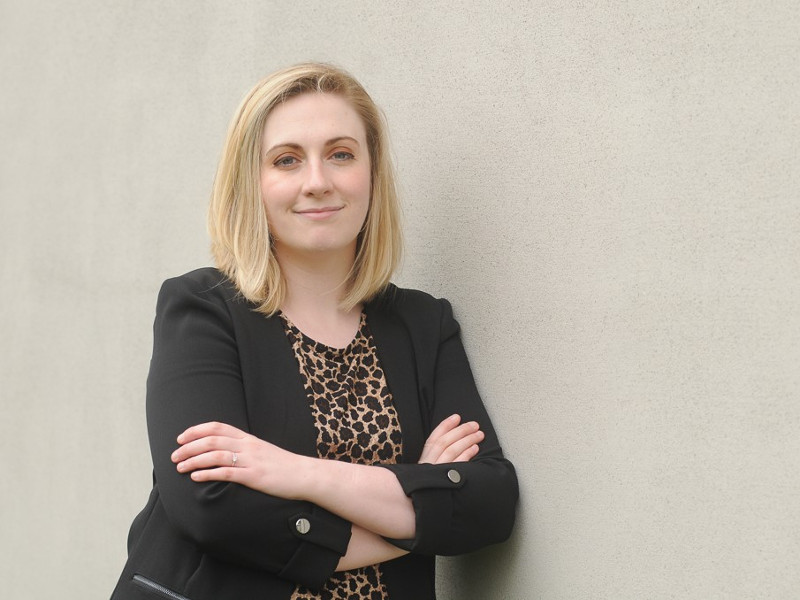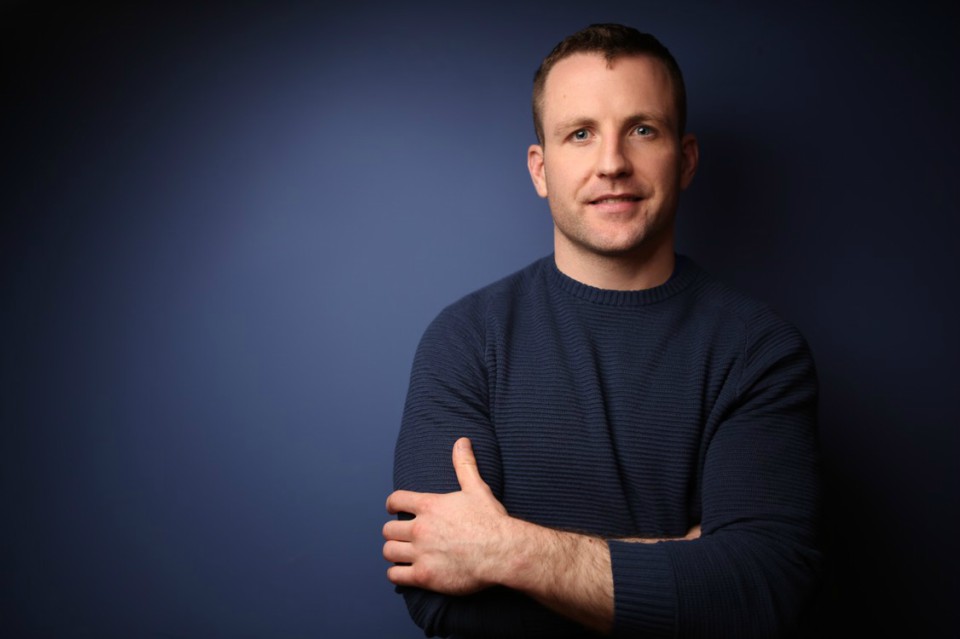Around one-third of the food we consume on the planet exists because it is pollinated by bees. And yet the bees are dying out. We talk to Dr Fiona Edwards Murphy from ApisProtect, a Cork start-up using the internet of things and AI to save the world’s honey bees.
“I probably learnt more in my first 12 months in business than I did in eight years of university,” jokes ApisProtect co-founder Edwards Murphy, a UCC PhD graduate who is an exemplar for what is possible when you consider commercialising the great work of third- and fourth-level students in Ireland.
The ApisProtect founder is amongst the most widely-published authors on the use of the internet of things – harnessing devices and mobile data – to help save the honeybees.
“If we lose the bees, we lose the ability to create food”
Dr Edwards Murphy’s work on the topic of hive monitoring has received many national and international awards from the Irish Research Council, The IEEE, IBM, The Irish Laboratory Awards, Google, and the Global Entrepreneurship Summit. In 2016 she was the only Irish recipient of a Google Anita Borg Memorial Scholarship.
Edwards Murphy completed her PhD with the School of Engineering, and the School of Biological, Earth and Environmental Sciences at University College Cork in the area of internet of things applications for honey bee health. She was awarded the Women Mean Business Sodexo Newcomer of the Year Award 2018 and was also shortlisted in The Irish Times as one of the 50 people to watch in Ireland in 2019.
The ApisProtect technology functions as a kind of early warning system so beekeepers can give at-risk hives immediate attention and improve bee health. The technology also gives beekeepers actionable insights and alerts to help prevent losses and increase colony productivity.
The company last year announced 25 new jobs after raising an investment round led by international venture capital investors Finistere Ventures and Atlantic Bridge Capital along with Radicle Growth, the Yield Lab and Enterprise Ireland.
Voice of the bee hive
Despite the accolades, Edwards Murphy is tackling a problem that could have dire consequences for the human race and a planet that is becoming overcrowded and polluted.
The UN’s Food and Agriculture Organisation estimates that 71 of the 100 most important crops that provide 90pc of food worldwide are pollinated by bees. However, the world is losing its honey bees because of climate change. In the US, commercial beekeepers have reported losses of up to 38pc of their colonies.
“If we lose the bees, we lose the ability to create food,” Edwards Murphy said flatly.
“Yes, about a third of the food we eat bees are responsible for, which is very important. Specifically honey bees are associated with an awful lot of nutritious crops, that are dense in vitamins, minerals and proteins. Things like blueberries, almonds, avocados, kiwis. It’s not just a third of the food but over the next 30 years we are going to need to increase our food output by at least 59pc. So, we are going to have to increase the amount of bees’ crops we need. But on top of that again we need to not just increase the total volume of food we produce but the kinds of food they pollinate.
“Things like nuts, berries, vegetables, we are going to have to make them a much larger portion of our diet than they are now. We are trying to be more efficient with agriculture,” said Edward Murphy who has just returned from the Forbes Agtech conference in Salinas, California, which is run by Irish entrepreneur John Hartnett.
Edwards Murphy became aware of the impending catastrophe whilst working on her PhD. “My background has nothing whatsoever to do with bees, which I think everybody is always surprised by. My background is engineering. I was studying electrical and electronic engineering at UCC where I fell in love with wireless sensor networks – now it is IoT – I just loved working with technology and circuits and putting them into the real world. Using sensors in the real world to directly impact things in the real world, that’s what I loved. I worked on a variety of different projects such as structural health monitoring, using sensors in the building sector, human health monitoring, education, and more.”
The crisis with the honey bees was brought to her attention by the head of the embedded systems group at UCC. “At that point I had had never been near a beehive, never even stung by a bee.I jumped in and it turned out to be a great decision. I agreed to spend four years of my life to work with them, and I absolutely fell in love with them.”
It was an astute move. Her PhD research led to her founding ApisProtect, using sensors to monitor honey bees in the hive, collecting temperature, CO2, and movement data from a single sensor installed in the hive. Currently, the company’s sensors are monitoring 10m bees in the US, the UK, Ireland and South Africa.
“They [the bees] are fascinating, especially from an engineering point of view. In engineering we are always looking at systems and it is just an unbelievable system; how the Queen reproduces and how she lays eggs and how they survive through hot and cold temperatures. I spent four years on my PhD. I learnt a lot about technology, in particular agricultural technology and the technical challenge around that. It’s an interesting area to be applying sensors because it is a very tough, rugged environment. Beehives are hot, they are wet and there are communications and energy problems. You can’t plug something in when it’s on a farm or out in a field. You don’t have a mobile network and no way to get your data back, so I love that whole area.”
Cork is buzzing with entrepreneurship
Asked about the transition from student to entrepreneur, Dr Edwards Murphy said that the journey was eased through taking part in the Ignite entrepreneurship programme at UCC.
“Ignite’s whole objective is to take recent graduates who have loads of ideas and ambition but maybe no knowledge of markets and that really did help me to develop my skills and get my feet on the ground with ApisProtect.
“Having two co-founders with more experience than me helped a lot as well. And then I think when you are going after something that you know you really believe in, you catch up fast enough. But definitely, I’ve always said it, I learned more in the first 12 months of running ApisProtect than over the entire eight years I spent in university. It was the biggest gear change I’ve ever experienced.”
The biggest challenge facing the young Cork company is scaling fast enough to address a real world challenge with time running out.
“Working on this technology in Ireland is fine but you’re never going to rock up to someone in California and go ‘hey, I’m bringing this thing from Ireland to you, please buy it’. I think the fact that we are already on the ground with sensors working in the US and around the world is a core part of how we are going to scale up for these markets.
“We are in 20 locations, 200 hives, and 160 of those hives are in the US and the rest are evenly spread between Ireland, the UK and South Africa.”
As well as receiving cloud credits from Amazon Web Services and Google, she said that global comms platform Inmarsat is powering ApisProtect’s connectivity.
“Right now we are in the peak of the technological development, taking the input from those deployments and reworking our system, going back to the drawing board to redevelop the technology for a commercial launch in early 2020 to be really in sync with the 2020 beekeeping season. It is really starting to get a lot of traction.”
If the success of ApisProtect is anything to go by, the salutary lesson is we need to do more to bridge the gap between what PhD students are building and converting them into entrepreneurs.
“What we have in Ireland is two great systems. We have a brilliant education system; the Irish Research Council is funding PhDs. Ad separately a brilliant entrepreneurial ecosystem. Two great ecosystems running in parallel. During my PhD, however, I wasn’t aware of bodies like Enterprise Ireland and what’s necessary is there needs to be a way to bring advocates from entrepreneurial world into the universities. Even a quick introduction for a PhD student into things like the Business Model Canvas; things like that a PhD student will just eat up, no problem. A really quick way to see if they have entrepreneurial instincts. And then once you’ve flicked that switch they are never going to stop thinking about it.”
But crucially, the real imperative is producing enough food for a planet hurtling towards 8bn people.
“There might not be awareness among the public, but the keepers and the growers are well aware that technology is needed in this area, that traditional beekeeping just can’t do what we need bees to do at this point.”
Like most Cork entrepreneurs, Edwards Murphy is fiercely proud of her home city. “Cork has been a perfect base for operations; the size of the city, the entrepreneurial ecosystem. It’s a great place to grow a tech company. We are always comparing ourselves with Dublin, but in Dublin there is a lot more pressure from competition for graduates and the cost of living is much higher. I definitely see us having a presence overseas. We have an office already in Salinas in California, but definitely our home is Cork and it will always be Cork.”
I point out that if a Californian company like Apple can mastermind the global distribution of the iPhone from Cork, then surely a Cork company can play a role in helping resolve a global food problem.
“We are at the bottom of the same hill in Cork that Apple are on top of, so we are just trying to emulate some of their success from down here,” she laughs.
Written by John Kennedy
Published: 12 July 2019







